The Story, Its Themes, and Futuristic Setting: A Detailed Analysis
VerifiedAdded on 2020/03/04
|5
|1416
|52
Essay
AI Summary
This essay provides an in-depth analysis of Ray Bradbury's 'The Veldt', focusing on the interplay between its themes and futuristic setting. The essay explores how the story utilizes a technologically advanced, consumer-driven society to represent themes of consumerism, dystopia, and the conflict between humans and machines. It examines the significance of the automated house and the nursery as key elements in establishing these themes, highlighting the characters' dependence on technology and the resulting consequences. Furthermore, the essay discusses the story's relevance to contemporary society, analyzing the critique of interpersonal communication and the dangers of over-reliance on technology. Through close examination of the narrative and the characters' actions, the essay argues that the futuristic setting serves as a metaphor for societal anxieties and potential pitfalls, ultimately emphasizing the importance of distinguishing between illusion and reality.
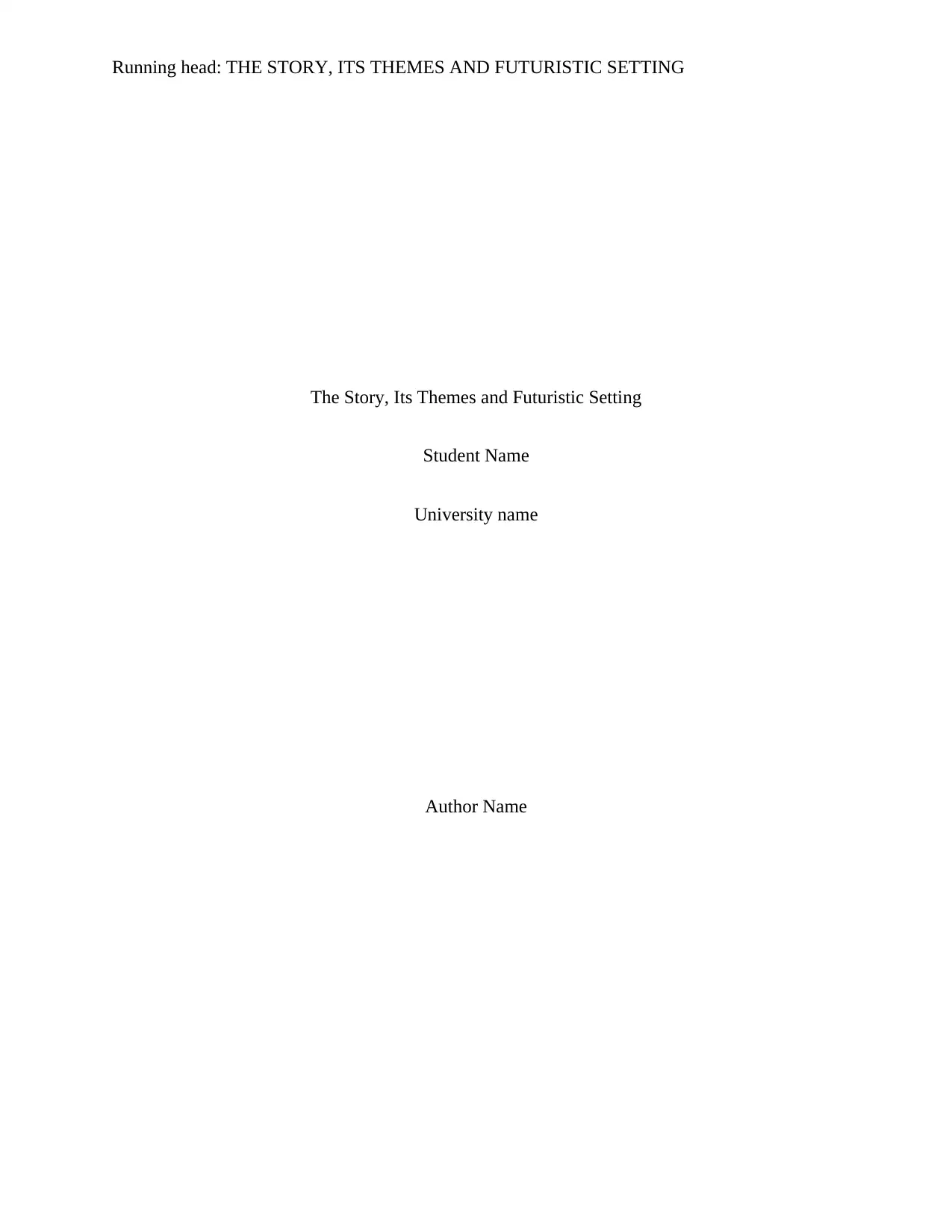
Running head: THE STORY, ITS THEMES AND FUTURISTIC SETTING
The Story, Its Themes and Futuristic Setting
Student Name
University name
Author Name
The Story, Its Themes and Futuristic Setting
Student Name
University name
Author Name
Paraphrase This Document
Need a fresh take? Get an instant paraphrase of this document with our AI Paraphraser
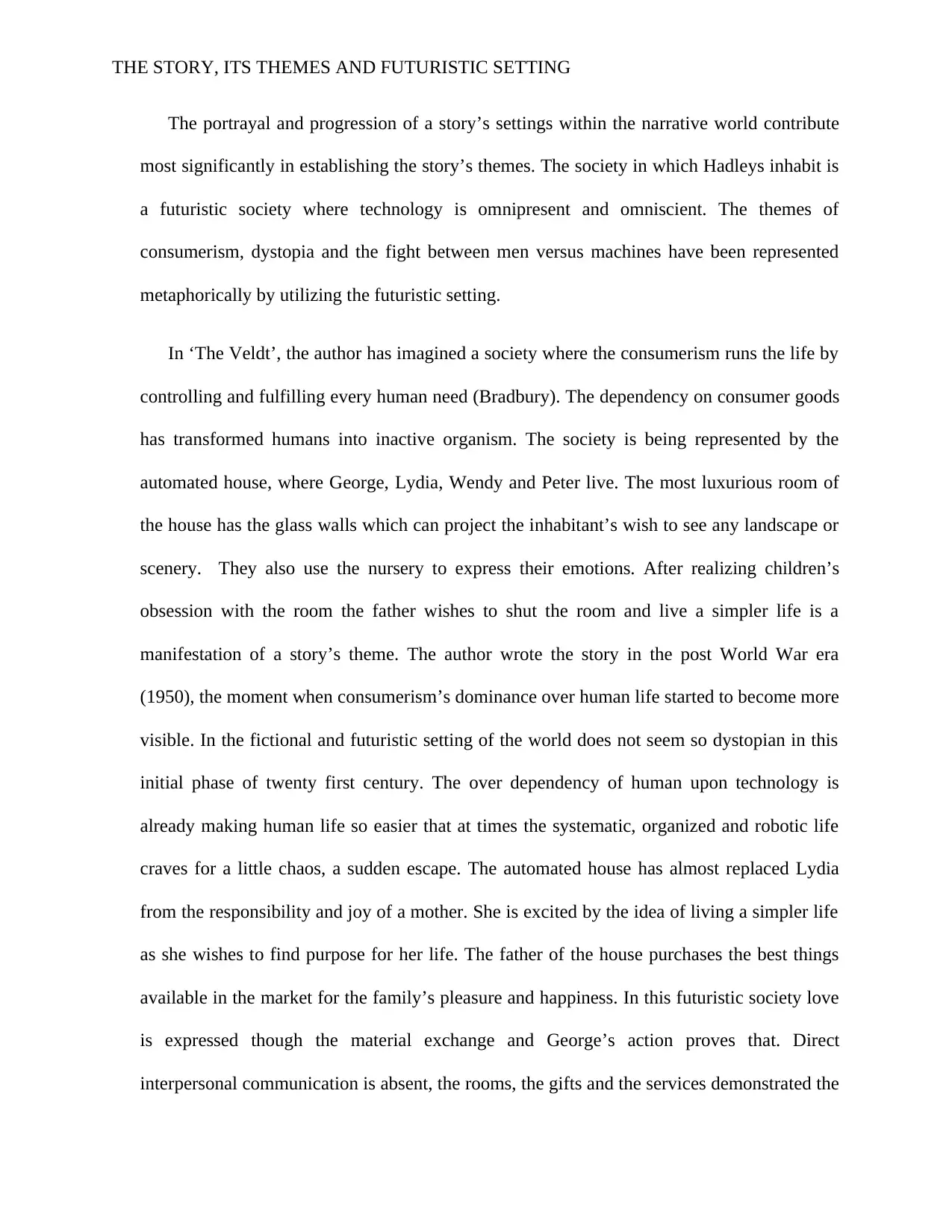
THE STORY, ITS THEMES AND FUTURISTIC SETTING
The portrayal and progression of a story’s settings within the narrative world contribute
most significantly in establishing the story’s themes. The society in which Hadleys inhabit is
a futuristic society where technology is omnipresent and omniscient. The themes of
consumerism, dystopia and the fight between men versus machines have been represented
metaphorically by utilizing the futuristic setting.
In ‘The Veldt’, the author has imagined a society where the consumerism runs the life by
controlling and fulfilling every human need (Bradbury). The dependency on consumer goods
has transformed humans into inactive organism. The society is being represented by the
automated house, where George, Lydia, Wendy and Peter live. The most luxurious room of
the house has the glass walls which can project the inhabitant’s wish to see any landscape or
scenery. They also use the nursery to express their emotions. After realizing children’s
obsession with the room the father wishes to shut the room and live a simpler life is a
manifestation of a story’s theme. The author wrote the story in the post World War era
(1950), the moment when consumerism’s dominance over human life started to become more
visible. In the fictional and futuristic setting of the world does not seem so dystopian in this
initial phase of twenty first century. The over dependency of human upon technology is
already making human life so easier that at times the systematic, organized and robotic life
craves for a little chaos, a sudden escape. The automated house has almost replaced Lydia
from the responsibility and joy of a mother. She is excited by the idea of living a simpler life
as she wishes to find purpose for her life. The father of the house purchases the best things
available in the market for the family’s pleasure and happiness. In this futuristic society love
is expressed though the material exchange and George’s action proves that. Direct
interpersonal communication is absent, the rooms, the gifts and the services demonstrated the
The portrayal and progression of a story’s settings within the narrative world contribute
most significantly in establishing the story’s themes. The society in which Hadleys inhabit is
a futuristic society where technology is omnipresent and omniscient. The themes of
consumerism, dystopia and the fight between men versus machines have been represented
metaphorically by utilizing the futuristic setting.
In ‘The Veldt’, the author has imagined a society where the consumerism runs the life by
controlling and fulfilling every human need (Bradbury). The dependency on consumer goods
has transformed humans into inactive organism. The society is being represented by the
automated house, where George, Lydia, Wendy and Peter live. The most luxurious room of
the house has the glass walls which can project the inhabitant’s wish to see any landscape or
scenery. They also use the nursery to express their emotions. After realizing children’s
obsession with the room the father wishes to shut the room and live a simpler life is a
manifestation of a story’s theme. The author wrote the story in the post World War era
(1950), the moment when consumerism’s dominance over human life started to become more
visible. In the fictional and futuristic setting of the world does not seem so dystopian in this
initial phase of twenty first century. The over dependency of human upon technology is
already making human life so easier that at times the systematic, organized and robotic life
craves for a little chaos, a sudden escape. The automated house has almost replaced Lydia
from the responsibility and joy of a mother. She is excited by the idea of living a simpler life
as she wishes to find purpose for her life. The father of the house purchases the best things
available in the market for the family’s pleasure and happiness. In this futuristic society love
is expressed though the material exchange and George’s action proves that. Direct
interpersonal communication is absent, the rooms, the gifts and the services demonstrated the
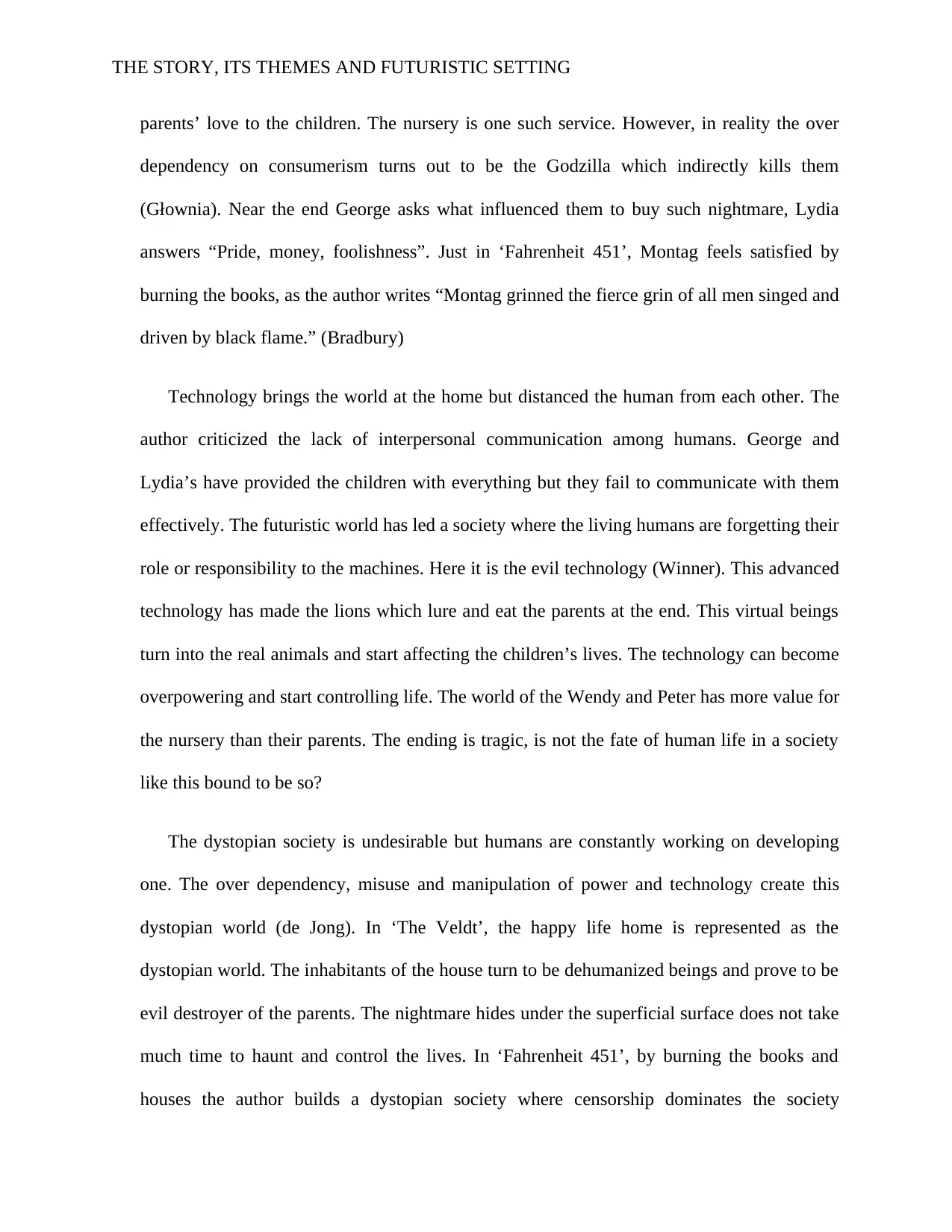
THE STORY, ITS THEMES AND FUTURISTIC SETTING
parents’ love to the children. The nursery is one such service. However, in reality the over
dependency on consumerism turns out to be the Godzilla which indirectly kills them
(Głownia). Near the end George asks what influenced them to buy such nightmare, Lydia
answers “Pride, money, foolishness”. Just in ‘Fahrenheit 451’, Montag feels satisfied by
burning the books, as the author writes “Montag grinned the fierce grin of all men singed and
driven by black flame.” (Bradbury)
Technology brings the world at the home but distanced the human from each other. The
author criticized the lack of interpersonal communication among humans. George and
Lydia’s have provided the children with everything but they fail to communicate with them
effectively. The futuristic world has led a society where the living humans are forgetting their
role or responsibility to the machines. Here it is the evil technology (Winner). This advanced
technology has made the lions which lure and eat the parents at the end. This virtual beings
turn into the real animals and start affecting the children’s lives. The technology can become
overpowering and start controlling life. The world of the Wendy and Peter has more value for
the nursery than their parents. The ending is tragic, is not the fate of human life in a society
like this bound to be so?
The dystopian society is undesirable but humans are constantly working on developing
one. The over dependency, misuse and manipulation of power and technology create this
dystopian world (de Jong). In ‘The Veldt’, the happy life home is represented as the
dystopian world. The inhabitants of the house turn to be dehumanized beings and prove to be
evil destroyer of the parents. The nightmare hides under the superficial surface does not take
much time to haunt and control the lives. In ‘Fahrenheit 451’, by burning the books and
houses the author builds a dystopian society where censorship dominates the society
parents’ love to the children. The nursery is one such service. However, in reality the over
dependency on consumerism turns out to be the Godzilla which indirectly kills them
(Głownia). Near the end George asks what influenced them to buy such nightmare, Lydia
answers “Pride, money, foolishness”. Just in ‘Fahrenheit 451’, Montag feels satisfied by
burning the books, as the author writes “Montag grinned the fierce grin of all men singed and
driven by black flame.” (Bradbury)
Technology brings the world at the home but distanced the human from each other. The
author criticized the lack of interpersonal communication among humans. George and
Lydia’s have provided the children with everything but they fail to communicate with them
effectively. The futuristic world has led a society where the living humans are forgetting their
role or responsibility to the machines. Here it is the evil technology (Winner). This advanced
technology has made the lions which lure and eat the parents at the end. This virtual beings
turn into the real animals and start affecting the children’s lives. The technology can become
overpowering and start controlling life. The world of the Wendy and Peter has more value for
the nursery than their parents. The ending is tragic, is not the fate of human life in a society
like this bound to be so?
The dystopian society is undesirable but humans are constantly working on developing
one. The over dependency, misuse and manipulation of power and technology create this
dystopian world (de Jong). In ‘The Veldt’, the happy life home is represented as the
dystopian world. The inhabitants of the house turn to be dehumanized beings and prove to be
evil destroyer of the parents. The nightmare hides under the superficial surface does not take
much time to haunt and control the lives. In ‘Fahrenheit 451’, by burning the books and
houses the author builds a dystopian society where censorship dominates the society
⊘ This is a preview!⊘
Do you want full access?
Subscribe today to unlock all pages.

Trusted by 1+ million students worldwide
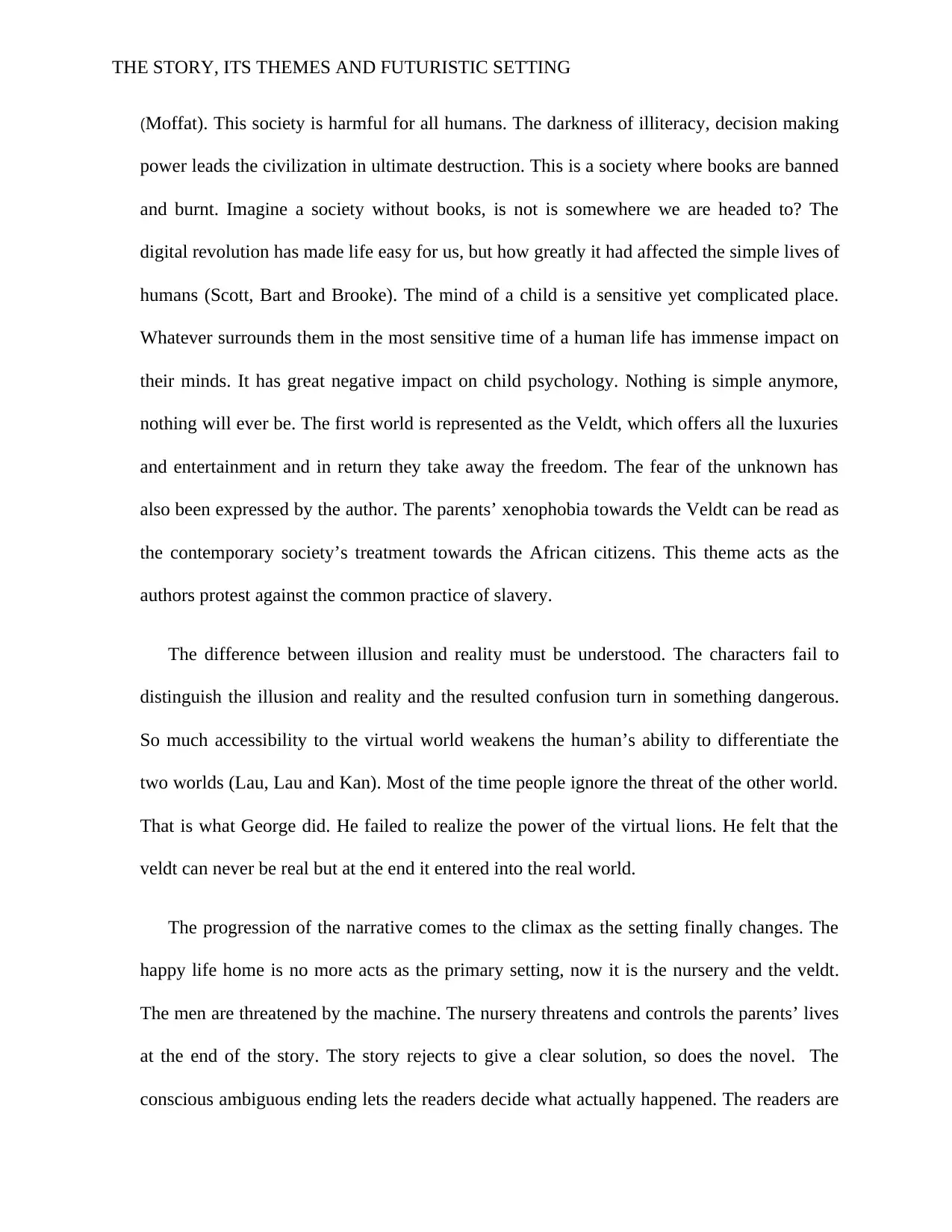
THE STORY, ITS THEMES AND FUTURISTIC SETTING
(Moffat). This society is harmful for all humans. The darkness of illiteracy, decision making
power leads the civilization in ultimate destruction. This is a society where books are banned
and burnt. Imagine a society without books, is not is somewhere we are headed to? The
digital revolution has made life easy for us, but how greatly it had affected the simple lives of
humans (Scott, Bart and Brooke). The mind of a child is a sensitive yet complicated place.
Whatever surrounds them in the most sensitive time of a human life has immense impact on
their minds. It has great negative impact on child psychology. Nothing is simple anymore,
nothing will ever be. The first world is represented as the Veldt, which offers all the luxuries
and entertainment and in return they take away the freedom. The fear of the unknown has
also been expressed by the author. The parents’ xenophobia towards the Veldt can be read as
the contemporary society’s treatment towards the African citizens. This theme acts as the
authors protest against the common practice of slavery.
The difference between illusion and reality must be understood. The characters fail to
distinguish the illusion and reality and the resulted confusion turn in something dangerous.
So much accessibility to the virtual world weakens the human’s ability to differentiate the
two worlds (Lau, Lau and Kan). Most of the time people ignore the threat of the other world.
That is what George did. He failed to realize the power of the virtual lions. He felt that the
veldt can never be real but at the end it entered into the real world.
The progression of the narrative comes to the climax as the setting finally changes. The
happy life home is no more acts as the primary setting, now it is the nursery and the veldt.
The men are threatened by the machine. The nursery threatens and controls the parents’ lives
at the end of the story. The story rejects to give a clear solution, so does the novel. The
conscious ambiguous ending lets the readers decide what actually happened. The readers are
(Moffat). This society is harmful for all humans. The darkness of illiteracy, decision making
power leads the civilization in ultimate destruction. This is a society where books are banned
and burnt. Imagine a society without books, is not is somewhere we are headed to? The
digital revolution has made life easy for us, but how greatly it had affected the simple lives of
humans (Scott, Bart and Brooke). The mind of a child is a sensitive yet complicated place.
Whatever surrounds them in the most sensitive time of a human life has immense impact on
their minds. It has great negative impact on child psychology. Nothing is simple anymore,
nothing will ever be. The first world is represented as the Veldt, which offers all the luxuries
and entertainment and in return they take away the freedom. The fear of the unknown has
also been expressed by the author. The parents’ xenophobia towards the Veldt can be read as
the contemporary society’s treatment towards the African citizens. This theme acts as the
authors protest against the common practice of slavery.
The difference between illusion and reality must be understood. The characters fail to
distinguish the illusion and reality and the resulted confusion turn in something dangerous.
So much accessibility to the virtual world weakens the human’s ability to differentiate the
two worlds (Lau, Lau and Kan). Most of the time people ignore the threat of the other world.
That is what George did. He failed to realize the power of the virtual lions. He felt that the
veldt can never be real but at the end it entered into the real world.
The progression of the narrative comes to the climax as the setting finally changes. The
happy life home is no more acts as the primary setting, now it is the nursery and the veldt.
The men are threatened by the machine. The nursery threatens and controls the parents’ lives
at the end of the story. The story rejects to give a clear solution, so does the novel. The
conscious ambiguous ending lets the readers decide what actually happened. The readers are
Paraphrase This Document
Need a fresh take? Get an instant paraphrase of this document with our AI Paraphraser
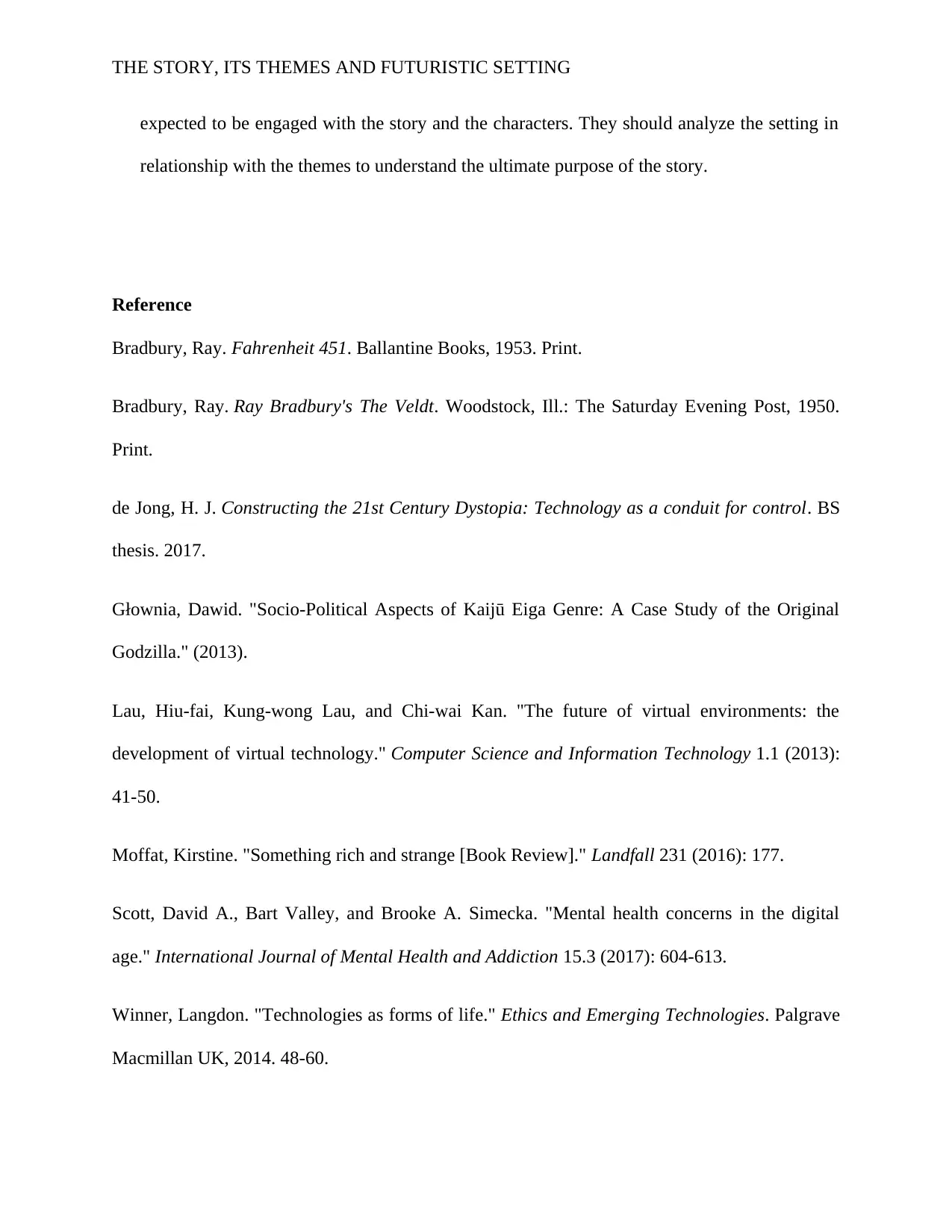
THE STORY, ITS THEMES AND FUTURISTIC SETTING
expected to be engaged with the story and the characters. They should analyze the setting in
relationship with the themes to understand the ultimate purpose of the story.
Reference
Bradbury, Ray. Fahrenheit 451. Ballantine Books, 1953. Print.
Bradbury, Ray. Ray Bradbury's The Veldt. Woodstock, Ill.: The Saturday Evening Post, 1950.
Print.
de Jong, H. J. Constructing the 21st Century Dystopia: Technology as a conduit for control. BS
thesis. 2017.
Głownia, Dawid. "Socio-Political Aspects of Kaijū Eiga Genre: A Case Study of the Original
Godzilla." (2013).
Lau, Hiu-fai, Kung-wong Lau, and Chi-wai Kan. "The future of virtual environments: the
development of virtual technology." Computer Science and Information Technology 1.1 (2013):
41-50.
Moffat, Kirstine. "Something rich and strange [Book Review]." Landfall 231 (2016): 177.
Scott, David A., Bart Valley, and Brooke A. Simecka. "Mental health concerns in the digital
age." International Journal of Mental Health and Addiction 15.3 (2017): 604-613.
Winner, Langdon. "Technologies as forms of life." Ethics and Emerging Technologies. Palgrave
Macmillan UK, 2014. 48-60.
expected to be engaged with the story and the characters. They should analyze the setting in
relationship with the themes to understand the ultimate purpose of the story.
Reference
Bradbury, Ray. Fahrenheit 451. Ballantine Books, 1953. Print.
Bradbury, Ray. Ray Bradbury's The Veldt. Woodstock, Ill.: The Saturday Evening Post, 1950.
Print.
de Jong, H. J. Constructing the 21st Century Dystopia: Technology as a conduit for control. BS
thesis. 2017.
Głownia, Dawid. "Socio-Political Aspects of Kaijū Eiga Genre: A Case Study of the Original
Godzilla." (2013).
Lau, Hiu-fai, Kung-wong Lau, and Chi-wai Kan. "The future of virtual environments: the
development of virtual technology." Computer Science and Information Technology 1.1 (2013):
41-50.
Moffat, Kirstine. "Something rich and strange [Book Review]." Landfall 231 (2016): 177.
Scott, David A., Bart Valley, and Brooke A. Simecka. "Mental health concerns in the digital
age." International Journal of Mental Health and Addiction 15.3 (2017): 604-613.
Winner, Langdon. "Technologies as forms of life." Ethics and Emerging Technologies. Palgrave
Macmillan UK, 2014. 48-60.
1 out of 5
Your All-in-One AI-Powered Toolkit for Academic Success.
+13062052269
info@desklib.com
Available 24*7 on WhatsApp / Email
![[object Object]](/_next/static/media/star-bottom.7253800d.svg)
Unlock your academic potential
Copyright © 2020–2026 A2Z Services. All Rights Reserved. Developed and managed by ZUCOL.